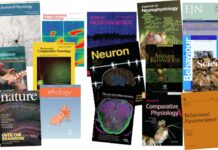Study Finds Music Therapy May Be Effective in Clinical Practice
In a new study published in The Journal of Child Psychology and Psychiatry, Professor Sam Porter and co-authors, present the results of a music...
Bipolar Diagnosis Linked to Childhood Adversity
With the ties between traumatic childhood experiences and mental health issues, should we continue to focus on biological approaches?
What Animal Research Says About Sexual Side-effects of SSRIs
A group of researchers in Denmark examines what existing animal studies can tell us about the sexual side-effects of SSRI antidepressants.
Evolution or Revolution? Why Western Psychiatry Won’t Change by Incremental Steps
...but how realistic is it to expect that the biological skew of Western psychiatry can be sustainably changed one small step at a time?
Antidepressant Effects Thwarted by Stressful Environments
A new study, about to be published in the journal Brain, Behavior, and Immunity, investigates the role a stressful environment plays in antidepressant effectiveness....
German Psychologists Declare “the Drugs Don’t Work”
Jürgen Margraf and Silvia Schneider, both well-known psychologists at the University of Bochum in Germany, claim that psychotropic drugs are no solution to mental...
Enough is Enough Series, #5 – The ADHD Fiction is Exposed. The French Have...
The time has come that the fictitious ADHD qualifies for my ‘Enough is Enough’ series. It’s time to stop addressing pharmaceutical psychiatry on its own terms: its fraudulent and corrupt 'science,' its spurious 'evidence base,' and its imaginary psychiatric ‘diseases.’ I’m done with this. The evidence is in. Let’s get real. Psychiatry has become a profession of drug pushers. As a psychiatrist I am beyond troubled. Let’s get real.
Review Finds Link Between Recession and Mental Health Issues
A literature review published in BMC Public Health by researchers from Portugal and the Czech Republic summarizes results from 101 studies investigating the effect...
Ioannidis Questions Strength of Psychology and Neuroscience Literature
Last week, well-known Stanford scientist John Ioannidis and his colleague Denes Szucs released a new analysis online. They examined research published in eighteen prominent...
Study Finds ADHD Drugs Alter Developing Brain
A new study, published in the JAMA Psychiatry, investigates the effect of stimulant ‘ADHD’ drugs on the brains of children and young adults. The...
Sociologist Explores the DSM-5’s Failed Attempt at Validity
In a new article for the journal Social Science & Medicine, sociologist Owen Whooley investigates how the DSM-5 creators failed in their attempt to...
“What if Addiction Is Not a Disease?”
For The Chronicle of Higher Education, David Schimke reports on how debate erupted at a substance abuse conference over whether or not addiction should...
Pilot Study Adapts Open Dialogue for US Health Care
In an article for Psychiatric Services, psychiatrist Christopher Gordon and his colleagues report on the results of a one-year feasibility study attempting to implement...
“Study Finds Mental Health Patients No Better Off Behind Locked Doors”
The Lancet Psychiatry published a study last week finding no benefit to locking up patients in mental health hospitals. Data on 145,000 patients found...
You Can Have Any Kind of Treatment You Want, Providing it’s Our Kind
Mental health nurse education supports institutional psychiatric practice in an insufficiently questioning way. Its formal curricula in universities are often undermined by the informal curricula of practice environments. As an institution, mental health nursing pays insufficient attention to both these issues because it is an arguably un-reflexive and rule-following discipline.
“Is Addiction Really a Disease?”
Neuroscientist and psychologist Marc Lewis, author of “The Biology of Desire: Why Addiction Is Not A Disease,” suggests in the Guardian that treating addiction as...
Study Finds Improved Functioning for ‘Schizophrenia’ Without Antipsychotics
Long-term treatment with antipsychotic drugs is currently considered the standard treatment for patients diagnosed with ‘schizophrenia.’ A new study challenges this practice, however. The...
Most People with Common ‘Mental Disorders’ Get Better Without Treatment, Study Finds
A new study suggests that most people diagnosed with depressive, anxiety, and substance abuse disorders recover without treatment within a year of diagnosis. “This...
Despite Official Recommendations, Depression Screening in Children is Not Supported by Research
Earlier this year, the US Preventative Services Task Force (USPSTF) came out with the controversial recommendation that all adolescent and adult patients undergo depression...
Neuroplasticity and How the Brain Heals
For The Lancet, Jules Morgan reviews a new book, “The Brain’s Way of Healing,” by psychiatrist and psychoanalyst Norman Doidge. Doidge challenges current understandings...
Antidepressants Often Prescribed to Enforce Heteronormativity, Study Concludes
A new study investigating fifteen years of patient records at a Midwestern hospital found that psychiatrists almost always responded to patient complaints about their relationships by prescribing antidepressants, despite the fact that these complaints had little to do with the DSM criteria for depression. The study’s lead author, Jonathan Metzl, a professor of Sociology and Medicine, Health and Society at Vanderbilt, suggests that after the decision in 1974 to remove homosexuality from the DSM, psychiatry continued to enforce socially accepted forms of relationships through the prescription of antidepressants.
“Antidepressants Are A Quick Fix In A Broken System”
For The Times, Labour MP Luciana Berger writes about her concerns with the increased use of antidepressants. “Antidepressants should never be prescribed as a...
Call For Abstracts: Philosophical Perspectives on Critical Psychiatry
The Association for Advancement in Philosophy and Psychiatry is issuing a call for abstracts, with a particular interest in submissions from service users. The...
Many Foster Kids Are Still Being Prescribed Antipsychotic Drugs
Many experts expressed concern when the rate of antipsychotic prescriptions to children in foster care showed a rapid increase, peaking in 2008, and new recommendations and policies have tried to curb the use of these drugs. While the rate has plateaued, a new study points out that the “new normal” prescription levels are still dangerously high. The data reveals that almost one in ten children in foster care are currently being prescribed antipsychotic drugs with dangerous side-effects, many for diagnoses like ‘ADHD’ and disruptive behavior.
JAMA Review Questions Use of Ritalin for ‘ADHD’
In December, MIA reported on a systematic Cochrane review on the research for the safety and effectiveness of Ritalin (methylphenidate) that found substantial bias...

















